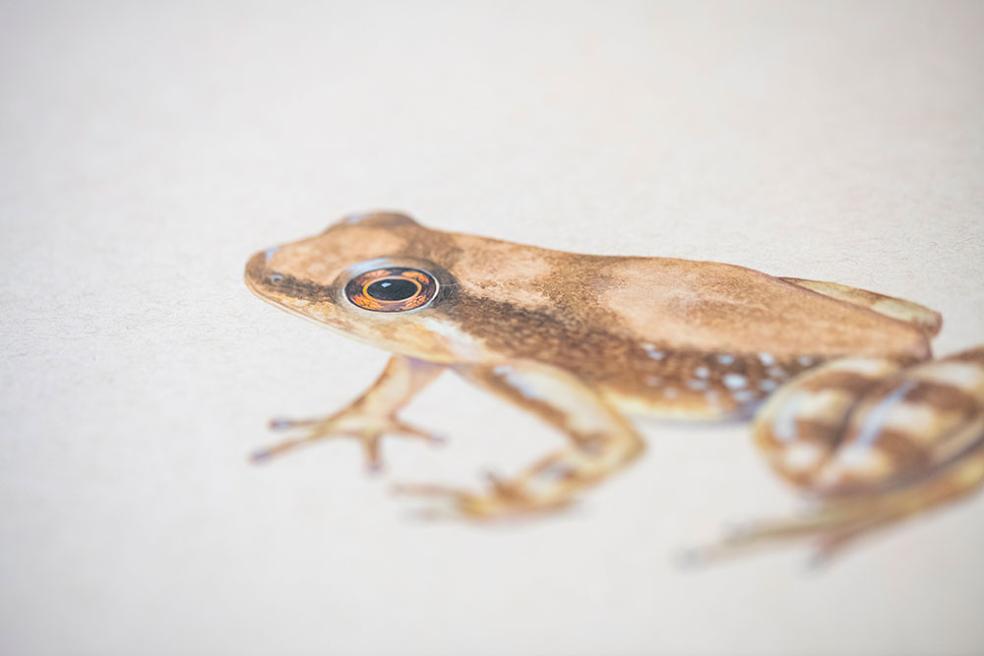
The project, Documenting Threatened Species (DoTS), is a bold initiative to study, document and
protect threatened species of amphibians in Brazil through the creation of a database and images of
endangered amphibian species, and by bringing scientific knowledge to new audiences through
lectures and activities in schools and communities.
"We are on a mission to breathe some life back into these lost amphibians. Through meticulous
research and collaboration with artists, we aim to create modern, scientifically-accurate renderings
of extinct or presumably extinct species from Brazil," says Peloso. He founded, directs and is the
lead scientist of the project, which is supported by a large network of partners.
Brazil, a country renowned for hosting one of the world's richest biodiversity hotspots, is facing a
poignant reality—some of its amphibian species are slipping away, possibly forever.
Amphibians stand apart from other animal groups as the most threatened of all—over 40% of
species are at risk of extinction. Brazil stands as the global guardian of amphibian diversity, hosting
one out of every eight species on the planet. Yet, this staggering diversity is rapidly diminishing.
According to the most recent numbers, Brazil is home to over 1,000 species of amphibians, many of
which do not exist anywhere else on the planet. Of these, almost 200 are considered threatened with
extinction. Moreover, many Brazilian amphibians are currently lost—they have not been observed in
the wild in many years, sometimes decades. Alarmingly, 26 Brazilian species are considered as
possibly extinct and two have been confirmed as extinct by amphibian specialists.
Distinguishing this project is the collaboration between scientists and artists, working in tandem to
recreate portraits of these animals, for some of which not even old photographs exist.
Peloso, amphibian specialist, and Cal Poly Humboldt Art Professor Brandice Guerra are hosting an
illustration internship at the University with the goal to produce illustrations that are not only
scientifically precise but also artistically distinctive. “Our vision is to transform these illustrations into
an emotive exhibit, chronicling the tales of Brazil's vanished amphibians,” Guerra says.
Art and science converge in Extintos, with the goal of engaging the public in a visually striking
narrative that underscores the critical state of amphibian conservation. To achieve this goal, the leaders of the project have recruited illustration interns from a pool of highly qualified applicants from multiple countries. The first intern is Jamie Hefley, a recent graduate in Biological Illustration who is eager to bring some of these lost amphibians back to life through her drawings.
“These illustrations should serve as a poignant reminder of the importance of preserving biodiversity and the collective
responsibility we bear," says Hefley.
About the project
"Extintos: Revealing the Beauty of Extinct Frogs from Brazil," is made possible through partnerships
between the Departments of Biological Sciences and Art + Film at Cal Poly Humboldt and the
documenting Threatened Species Project (www.projetodots.org). The project is supported by grants
from the Maxwell-Hanrahan Foundation (www.maxwell-hanrahan.org).
About the “Documenting Threatened Species (DoTS) project”
DoTS is a bold initiative to study, document, and protect threatened species of amphibians in Brazil.
Since its inception, the project has conducted 11 expeditions and photographed highly endangered
and extremely rare species of frogs from all over Brazil, introducing many of these species to a
global audience. The overarching goal of the project is to create awareness about amphibian
extinctions through rigorous science and creative artistic expressions. The project is directed by
Brazilian biologist and conservation photographer Pedro Peloso and is supported by a large network
of partners (individuals and institutions).
For more information, visit www.projetodots.org, or contact:
projetodots@institutoboitata.org
Pedro Peloso, PhD
Project Coordinator
Department of Biological Sciences at Cal Poly Humboldt
pedropeloso@humboldt.edu